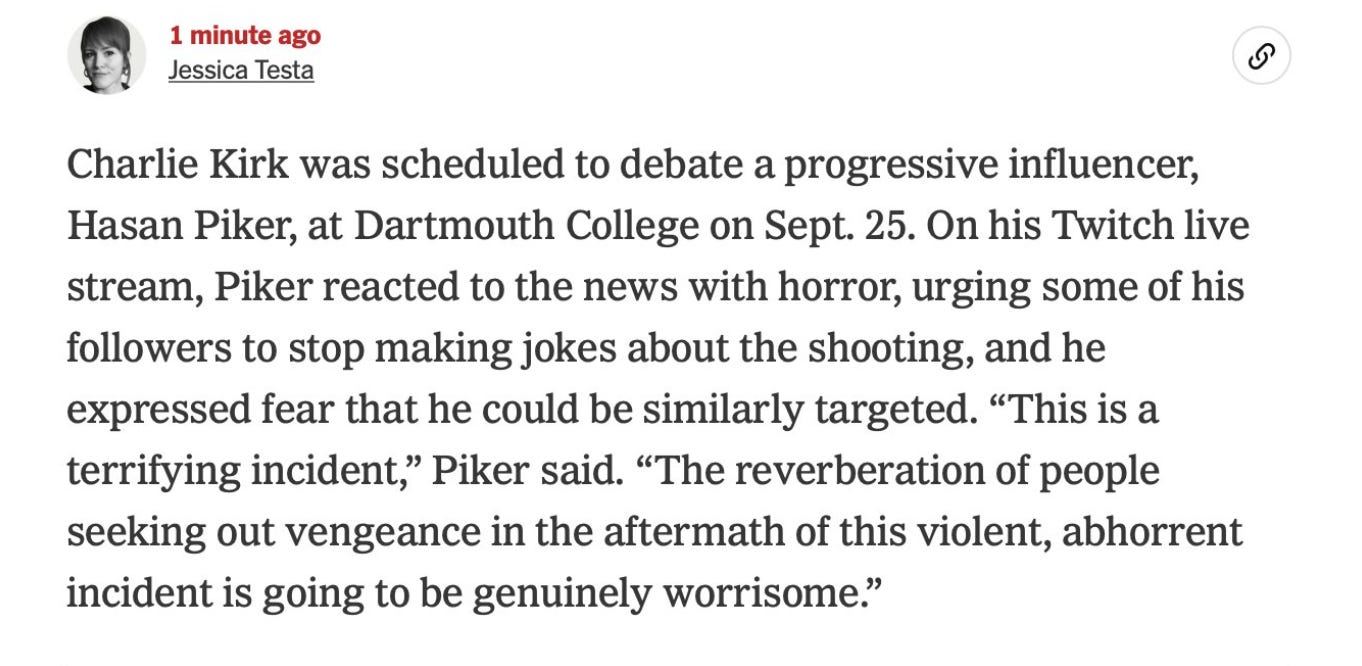The Problem Isn't the Volume
Political nationalization and policy federalization are killing us.
Like anyone with a conscience, I’m disgusted by the murder of Charlie Kirk, not just because I believe the taking of another life in such a way and for no more than speaking one’s mind is reprehensible. The distinct tragedy of political violence, in this case murder, is that the effects are not limited to the victim or their family but affect everyone who chooses to speak and publish openly about politics. Take the response from Hasan Piker, Kirk’s left-wing counterpart, who now is in fear of his own safety because of the actions of one savage killer. He should not be, and I hope people like him, regardless of their views, continue to speak openly. Unlike serial killers or mass shooters that prey on those when they are the least guarded and whose premises are virtually universally condemned, political killers operate on a pretense of justification that, as Piker is quoted saying, reverberates across the spectrum of ideas and the institutions where those ideas are presented.
Independent of that, I do believe the calls for “unity” and to “tone the volume down” so entirely miss the point over the predominant force that is exacerbating adverse political division across the union — and that is political nationalization and policy federalization. The artificial, needlessly high stakes over cultural and public policy issues and the insistence that all of these are and must be national issues addressed by the federal government — is killing us at its worst and setting the federation on the wrong track at the very least.
If every political fight is a national one, then losing anywhere means losing everywhere. Political opponents are no longer rivals to be checked at the ballot box; they are existential threats who must be stopped at any cost. In this atmosphere, assassination ceases to be unthinkable. It becomes, for some, the grim logic of a zero-sum game. Kirk’s murder was not an aberration. It was the predictable outcome of a system designed to maximize conflict and concentrate political-cultural influence among a minority of D.C.-N.Y. elite and hard political power in the hands of fewer people.
There are the major structural examples of this: the momentarily tight partisan alignment between the levels of government, the funding of local races by national figures and interest groups, the hollowing out of local media, and the rise of partisan for-profit and non-profit newsrooms that push nothing but a national frame. The aggrandizement of the presidency by the Washington political media into a cultural figure. But there are also the death-by-a-thousand-paper-cuts examples": The reductive “Trump states and Harris states” push a binary that erases the myriad of other relevant and interesting ways the electorate sorts itself, a city council candidate feeling compelled to take a position on Gaza; a county judge grilled about Trump at a local forum; a parks bond campaign reduced to whether it signals allegiance to “woke” climate policy.
More to the point, that every American needs to reconcile their own identity as an American with some vacuous sense of unity is a civil hardship. Instead of allowing space for difference, this deeply entrenched expectation insists that to be a decent American means being burdened with having to strive for a national consensus or be left as a citizen of a dysfunctional or so-called “sclerotic” political experiment. This nationalization of the American conscience in a land as vast and diverse as the United States prompts a generational effort to ventilate and disperse our politics away from Washington — to prompt more voices in more places, not fewer ones that perpetuate an unattainable and undesirable vision for totalizing uniformity dressed as unity.
We need more national leaders who have the courage to at the very least acknowledge that there is another way to do politics in the United States, and it is as inspired by Thomas Jefferson and James Madison as it is compatible with the future of an increasingly diversifying and culturally democratized union of states. Currently, I see no politicians, academics, advocates, or journalists committed to what should be a very clear and obvious alternative to the entrenched paradigm on which American politics is premised. If you see anybody with integrity who regularly speaks to this issue or in favor of decentralization, feel free to comment below or send me a message.
We need a new pluralistic, democratic, and orderly politics that does not revolve around the burden of having to adhere to a single interpretation of “the nation” or “America”.
Alas, the volume is not the problem. The power, specifically where it is located, is the problem.




